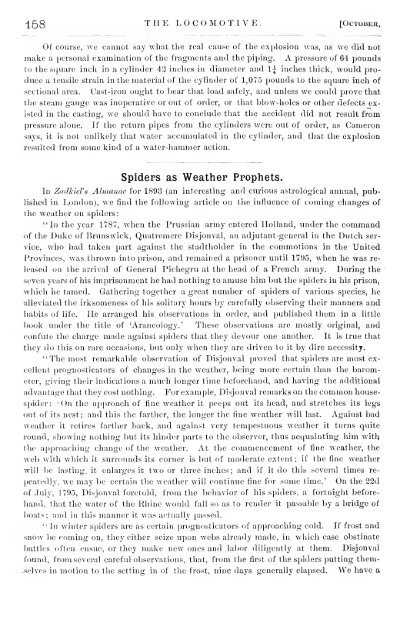The Locomotive - Lighthouse Survival Blog
The Locomotive - Lighthouse Survival Blog
The Locomotive - Lighthouse Survival Blog
You also want an ePaper? Increase the reach of your titles
YUMPU automatically turns print PDFs into web optimized ePapers that Google loves.
158 THE LOCOMOTIVE. [October,<br />
Of course, we cannot say what the real cause of the explosion was, as we did not<br />
make a personal examination of the fragments and the piping. A pressure of 64 pounds<br />
to the square inch in a cylinder 42 inches in diameter and 1^ inches thick, would pro-<br />
duce a tensile strain in the material of the cylinder of 1,075 jiounds to the square inch of<br />
.sectional area. Cast-iron ought to bear that load safely, and unless we could prove that<br />
the steam gauge was inoperative or out of order, or that blow-holes or other defects ex-<br />
isted in the casting, we should have to conclude that the accident did not result from<br />
pressure alone. If the return pipes from the cylinders were out of order, as Cameron<br />
says, it is not unlikely that water accumulated in the cylinder, and that the explosion<br />
Tesulted from some kind of a water-hammer action.<br />
Spiders as Weather Prophets.<br />
In ZadlcieVs Almanac for 1893 (an interesting and curious astrological annual, pub-<br />
lished in London), we find the following article on the influence of coming changes of<br />
the weather on spiders:<br />
"In the year 1787, when the Prussian array entered Holland, under the command<br />
of the Duke of Brunswick, Quatremere Disjonval, an adjutant-general in the Dutch ser-<br />
vice, who had taken part against the stadtholder in the commotions in the United<br />
Provinces, was thrown into prison, and remained a prisoner until 1795, when he was re-<br />
leased on the arrival of General Pichegru at the head of a French army. During the<br />
seven years of his imprisonment he had nothing to amuse him but the spiders in his prison,<br />
which he tamed. Gathering together a great number of spiders of various species, he<br />
-alleviated the irksomeness of his solitary hours by carefully observing their manners and<br />
habits of life. He arranged his observations in order, and published them in a little<br />
book under the title of 'Araneology.' <strong>The</strong>se observations are mostly original, and<br />
-confute the charge made against spiders that they devour one another. It is true that<br />
they do this on rare occasions, but only when they are driven to it by dire necessity.<br />
"<strong>The</strong> most remarkable observation of Disjonval proved that spiders are most ex-<br />
cellent prognosticators of changes in the weather, being more certain than the barom-<br />
eter, giving their indications a much longer time beforehand, and having the additional<br />
advantage that they cost nothing. For example, Disjonval remarks on the common house-<br />
spider: -On the approach of fine weather it peeps out its head, and stretches its legs<br />
out of its nest; and this the farther, the longer the fine weather will last. Against bad<br />
weather it retires farther back, and against very tempestuous weather it turns quite<br />
round, showing nothing but its hinder j^arts to the observer, thus acquainting him with<br />
the approaching change of the weather. At the commencement of fine weather, the<br />
web with which it surrounds its corner is but of moderate extent; if the fine weather<br />
will be lasting, it enlarges it two or three inches; and if it do this several times re-<br />
peatedly, we may be certain the weather will continue fine for some time.' On the 23d<br />
-of July, 1795, Disjonval foretold, from the behavior of his spiders, a fortnight before-<br />
hand, that the water of the Rhine would fall so as to render it passable by a bridge of<br />
boats; and in this manner it was actually passed.<br />
" In winter spiders are as certain prognosticators of approaching cold. If frost and<br />
;snow be coming on, they either seize upon webs already made, in which case obstinate<br />
loattles often ensue, or they make new ones and labor diligently at them. Disjonval<br />
found, from several careful observations, that, from the first of the spiders putting them-<br />
selves in motion to the setting in of the frost, nine days generally elapsed. We have a
















